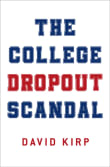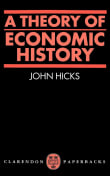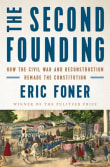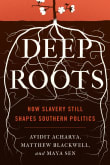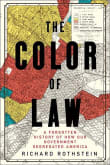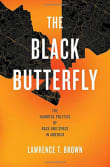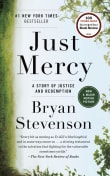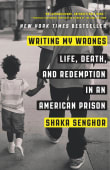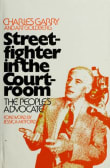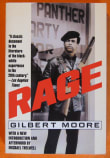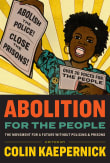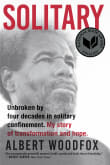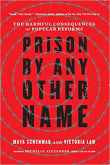The New Jim Crow
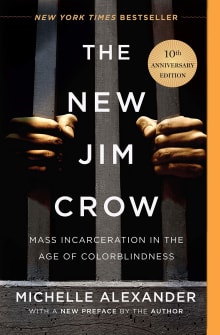
Book description
Seldom does a book have the impact of Michelle Alexander's The New Jim Crow. Since it was first published in 2010, it has been cited in judicial decisions and has been adopted in campus-wide and community-wide reads; it has been the winner of numerous prizes, including the NAACP Image Award;…
Why read it?
10 authors picked The New Jim Crow as one of their favorite books. Why do they recommend it?

I knew Michelle when she was teaching at Stanford University before she wrote this book, but I didn’t know then how much of the work she’d done. Her book is so profound that when I first read it, I was in Vegas on vacation, and I couldn’t get out of the room because I was so deep into reading her book. I couldn’t get to the great food or the penny slots because she was putting together all the pieces I had read about or heard discussed in different places, and she built a picture of the system of oppression…
From Dorsey's list on the strength it takes to be Black in America.

First released in 2010, Alexander’s seminal book on racial justice still impacts new generations of social activists. Her startling revelations—like the fact that there are more Black men and women under correctional control (either in jail or prison or under supervision by parole or probation departments) than were enslaved in the 1800s—are difficult to reckon with but important to consider.
The book was written after the election of America’s first Black president, Barack Obama when the idea of “colorblindness” was gaining popularity. However, as Alexander points out, the elevation of a single individual did not wipe out the extreme racial…
From Paula's list on easing you out of your comfort zone.

I found Michelle Alexander’s book a potent reminder that the past is never really past, and that older practices of racial subjugation and use of the criminal law against minorities can be repurposed in later eras to serve the same or related ends.
The book raises the question of whether Jim Crow has really ended in all institutions in American society.
From Robert's list on the role of race and poverty in the criminal justice system.
If you love The New Jim Crow...

Michelle Alexander doesn’t need another recommendation for her book, but we’ll do it anyway because it’s that good!
We love books that amp us up and make us feel smarter after we’ve read the last page. Like the wool has been uncovered from our eyes, we would argue it may be one of the best books about civil rights, but since we haven’t read them all yet, we’ll lean on how well-written, alarming, and inspiring it is.
Even though we thought we knew a little about a lot of things, this book showed us how much more there is to…
From Akwasi and Tahira's list on social justice and the need for transformative change.

I thought I knew a decent amount about mass incarceration, but this book showed me just how much I didn’t know. It also deepened my commitment to fighting for anti-racist laws and enhanced my longstanding interest in defending the rights of incarcerated people. The New Jim Crow inspired me to read and write more about criminal justice issues and awakened my interest in prison abolition and restorative justice. I especially admire, and have sought to emulate, Alexander’s passion; it’s always impressive when an author’s justifiable anger spurs her to write a more extensive and rigorous book than someone who cared…
From Raina's list on American politics for open-minded readers.

This is the most popular introduction to mass incarceration. Alexander views mass incarceration through the lens of racial justice, focusing on how locking up millions of people, a disproportionate number of whom are Black, amounts to a new system of racial segregation. The New Jim Crow has been a catalyst for understanding and activism for thousands of people across the country and has spent several years on the New York Times bestseller list.
From James' list on mass incarceration.

Michelle Alexander launched her book with the ringing endorsement of a mutual friend of us both, Eva Paterson, the Executive Director of the Equal Justice Society. Both of them are civil rights lawyers whom I greatly admire for their extraordinary accomplishments. Alexander’s bestseller has been hugely influential in opening eyes to the deplorable racial disparity in incarceration rates in the United States and in galvanizing ongoing efforts to effect meaningful reforms.
From Lise's list on trail-blazing lawyers passionately fighting for social justice.

The New Jim Crow is essentially a beginner's guide to the Criminal Industrial Complex. The first time I read it I was still in prison. And let me tell you, it was an infuriating experience. I was sitting in a cell being told everything that had led me, on a societal level, to exactly where I was in that moment. It showed me, in plain terms, everything that would be stacked against me if I ever got released. But it also gave me a certain freedom to understand how to escape the criminal justice system’s traps when I got out.…
From Chris' list on the criminal industrial complex.

This widely celebrated, influential book needs no further promotion, but in light of the current debates around systemic racism and criminal justice reform, it is simply impossible to understate the contemporary salience of Alexander’s important book. The book also fits the list’s focus on the imprint of race and racism on public policy, in this case, judicial and criminal justice policy.
From Doug's list on the impact of race on American politics.

It makes a good case for seeing our current mass incarceration as a new Jim Crow law. And I have become convinced that the US cannot reform public education without eliminating mass incarceration.
From Peter's list on racial and economic inequality in the USA.
Want books like The New Jim Crow?
Our community of 12,000+ authors has personally recommended 100 books like The New Jim Crow.


